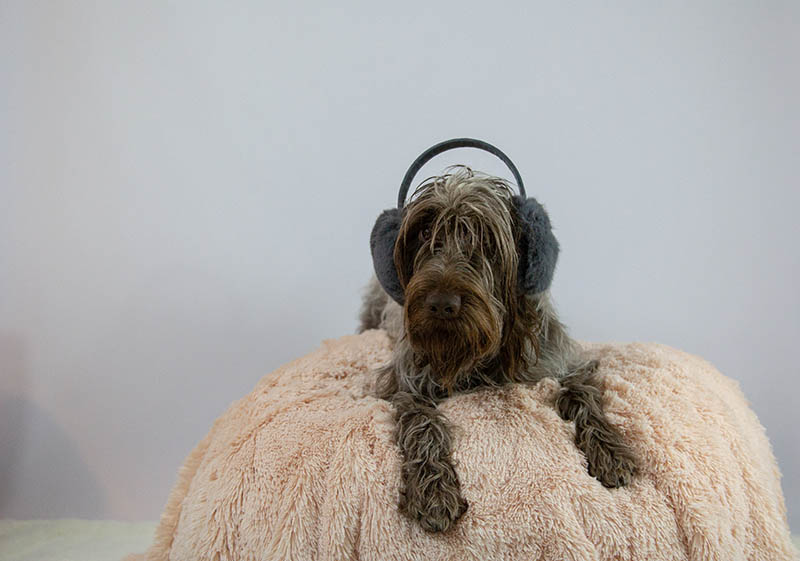If you’re fond of jamming to your favorite tunes at the loudest volume possible, you might be aware that this pastime could eventually harm your hearing. However, dog owners who play their music loud might also wonder if they could be negatively impacting their pets as well. Is loud music bad for a dog?
Loud music could potentially harm your dog’s hearing long-term and is probably uncomfortable for them even in the short term. In this article, we’ll learn a bit about your dog’s sense of hearing and how loud noises could impact it. We’ll also tell you what to do if you’re concerned your dog is losing their hearing for any reason.
Your Dog’s Sense of Hearing
Compared to humans, dogs have a much more sensitive hearing ability. Dogs can hear sounds that vibrate up to a frequency of 50,000 vibrations per second. Humans can’t hear anything higher than 20,000 vibrations per second.
Dogs can hear independently with each ear and have the ability to filter out sounds they aren’t interested in to focus on what they want to hear. They can also detect differences between sound frequencies, however slight.
One reason dogs can hear so well is because of their ability to move their ears much better than humans. Dogs have three times as many muscles controlling their ears as we do, allowing them to swivel them in all directions to locate where a sound is coming from.

Why Loud Music Can Hurt Your Dog’s Ears
Because your dog’s ears are so much more sensitive, even everyday sounds that don’t bother us can be irritating to them. If that’s the case, imagine how loud your music will be to your dog if it already sounds loud to you!
If exposed over time, loud sounds, such as music, may damage the delicate structures inside our dog’s ears, leading to hearing loss. Researchers found this to be the case by studying the experiences of a police dog, a drug-sniffing dog, and a hunting dog. All three showed signs of noise-induced hearing loss.
Unfortunately, there are currently no studies that can confirm exactly how loud is too loud for dogs. In general, we recommend you err on the side of caution and keep your music at or below a safe level for humans, about 70 decibels or just slightly louder than a normal conversation.

How to Protect Your Dog’s Ears From Loud Music
The best way to protect your dog’s hearing from loud music is not to play it around them. Keep your tunes at a lower level or connect your favorite pair of headphones. If you’re throwing a party, consider keeping your dog outside or in a separate part of the house.
Dogs who will be consistently exposed to loud noises should wear hearing protection. Several different types of protective earphones for dogs are available. If you want to blast your favorite Taylor Swift album with your dog in the car, consider investing in some canine ear gear.

What to Do If You Think Your Dog Is Going Deaf
Dogs can lose their hearing for many different reasons besides noise damage. Deafness is an inherited trait in some breeds of dogs, causing some pups to be born with hearing loss. Dogs can also lose their hearing as they age. Sometimes, dogs will lose their hearing as a side effect of an ear infection or tumors in their ears.
- Not responding to their name or commands
- Don’t seem to hear every day sounds like the doorbell
- Don’t seem to pay attention to you anymore
- Harder to wake up when sleeping
- Excessive barking
- Shaking or tilting their head
If you notice any of these signs, have your dog examined by a veterinarian. Some causes of hearing loss, like ear infections, can be treated while others are permanent.
If your dog’s hearing loss is permanent, you’ll need to make some adjustments to your life but don’t feel bad for your pup. Owners are usually more concerned about their dog’s deafness than they are!
To keep your deaf dog safe, make sure they are always on a leash when outside the yard because they won’t be able to hear cars or other dangers approaching. Learn new ways of getting their attention like tapping them or flashing lights at them. You can train your dog using hand signals.
Consider attaching a bell to your dog’s collar so you can find them in the house since they can’t come when you call.
In Conclusion
Before you turn up the volume on your music, consider the impact it may have on your dog. Turning down your music is just one small sacrifice you’ll have to make when you choose to share your life with a dog.
Featured Image Credit: Monkey Business Images, Shutterstock












